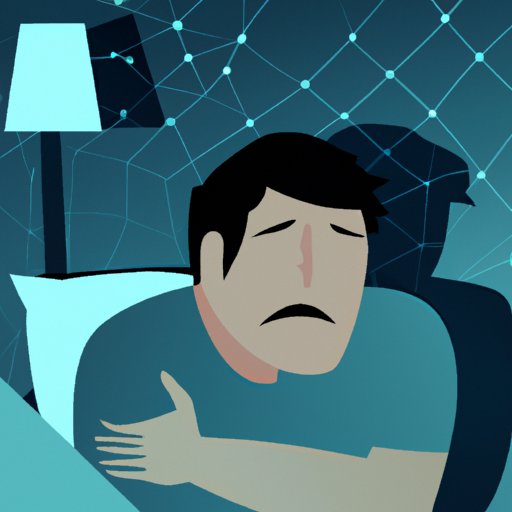Introduction
Getting enough restful sleep is essential for your overall health and wellbeing. Unfortunately, many people don’t get the recommended seven to nine hours of sleep each night, leading to a variety of health issues. In this article, we’ll explore the link between lack of sleep and poor health, examining how sleep deprivation impacts your body and what you can do to get the restful sleep you need.

Examining the Impact of Sleep Deprivation on Your Body
Sleep deprivation is defined as not getting enough sleep or having poor quality sleep. When you don’t get enough sleep, it can have a negative impact on your body in a number of ways.
The Negative Consequences of Insomnia
Insomnia is a common sleep disorder that makes it difficult to fall asleep and stay asleep. It can be caused by stress, anxiety, depression, or other medical conditions such as chronic pain. People with insomnia often experience daytime fatigue and difficulty concentrating, which can lead to poorer performance at work or school.
Effects on Physical Health
Lack of sleep also has an impact on your physical health. Studies have shown that people who don’t get enough sleep are more likely to suffer from obesity, high blood pressure, heart disease, diabetes, and stroke. Sleep deprivation can also weaken your immune system, making you more susceptible to illness.
Effects on Mental Health
Sleep deprivation can also affect your mental health. People who don’t get enough sleep are more likely to suffer from depression, anxiety, and mood swings. They may also have difficulty focusing and making decisions, as well as memory problems.

How to Recognize Signs of Sleep Deprivation
It’s important to recognize the signs of sleep deprivation so that you can take steps to address the issue. Common symptoms include feeling tired during the day, difficulty falling asleep or staying asleep, irritability, and difficulty concentrating.
Diagnosing and Treating Sleep Deprivation
If you suspect that you’re suffering from sleep deprivation, it’s important to talk to your doctor. They can help diagnose the cause of your sleep problems and recommend treatment options such as medications, lifestyle changes, or cognitive-behavioral therapy.

Tips for Getting Quality Sleep
Getting quality sleep is essential for good health and wellbeing. Here are some tips for improving your sleep:
Establishing a Sleep Schedule
Try to go to bed and wake up at the same time each day, even on weekends. This will help your body adjust to a regular sleep schedule.
Creating a Relaxing Bedtime Routine
In the hour before bedtime, turn off all electronic devices and focus on relaxing activities such as reading, taking a bath, or listening to calming music. Doing this will help your body and mind relax, making it easier to fall asleep.
Making Your Bedroom Conducive to Sleep
Create a bedroom environment that is conducive to sleep. Keep the room dark and quiet, and make sure the temperature is comfortable. Avoid watching TV or using other electronic devices in bed, as the blue light from these devices can disrupt your sleep.
Avoiding Stimulants Late in the Day
Caffeine and other stimulants should be avoided in the late afternoon and evening, as they can make it harder to fall asleep. Alcohol should also be avoided close to bedtime, as it can interfere with your sleep cycle.
Investigating the Relationship Between Sleep and Mental Health
Sleep and mental health are closely linked, and sleep deprivation can have a serious impact on your mental health. It’s important to understand the connection between the two and take steps to ensure you’re getting enough restful sleep.
Understanding the Connection
Research has shown that sleep plays an important role in mental health. People who don’t get enough sleep are more likely to suffer from depression, anxiety, and other mental health issues. Lack of sleep can also worsen existing mental health conditions.
How Sleep Deprivation Affects Mental Health
Sleep deprivation can impair your ability to think clearly, leading to difficulty making decisions and solving problems. It can also lead to increased feelings of stress and anxiety and make it harder to regulate emotions. Finally, lack of sleep can interfere with memory formation and recall.
Treatment Options for Sleep-Related Mental Health Issues
If you’re experiencing mental health issues related to sleep deprivation, there are a number of treatment options available. These include cognitive-behavioral therapy, medications, and lifestyle changes such as establishing a regular sleep schedule and avoiding stimulants late in the day.
Conclusion
In conclusion, lack of sleep can have a serious impact on your health. It can lead to physical health issues such as obesity, high blood pressure, and heart disease, as well as mental health issues such as depression, anxiety, and difficulty concentrating. To get the restful sleep you need, it’s important to establish a regular sleep schedule, create a relaxing bedtime routine, make your bedroom conducive to sleep, and avoid stimulants late in the day. If you’re experiencing sleep-related mental health issues, talk to your doctor about treatment options.
By following these tips and understanding the link between lack of sleep and poor health, you can ensure that you’re getting the restful sleep you need to stay healthy and happy.


